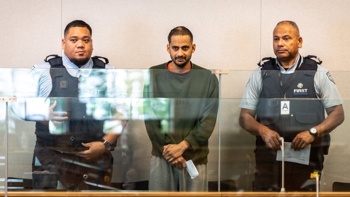and
A new report that prefers Manukau Harbour over Northland for a new port is being slammed with the Government being urged to get back the $2 million that it paid for it.
The Government officially today released the major new report on the options for relocating the Port of Auckland's freight operations, but deferred any decision on the issue to future government.
While Auckland Mayor Phil Goff has welcomed the report, that recommends relocating the port within the region, the author of the Government's original report, and others in the shipping industry, say Manukau is not an option due to both logistical and ecological issues.
Wayne Brown authored the first report - Upper North Island Supply Chain Study (UNISCS) - and said those involved with the latest investigation should give the taxpayers their $2m back.
"I'm very disappointed because the Manukau harbour is a very shallow harbour with a dangerous shifting sand bar at the entrance ... and the Maritime Insurance won't insure boats going in there, so we didn't spend any time on that.
"It's on the wrong side of the coast. The ships like to come down the other side because it's between China and South America."
Brown, who is chairman of Upper North Island Supply Chain Strategy (UNISCS) working group, was also annoyed to last night discover the authors of the $2m report - Sapere - were health economists, and not involved in the transport sector unlike himself and the other 80 who contributed to his findings.
He was also aggrieved at not being given a heads-up about the findings from the Government.
"This is a disgrace ... The Prime Minister's done a good job of Covid but she's got to get rid of that idiot [Twyford]," a "grumpy" Brown told the Herald today.
His report recommended the port should be moved to Northland, starting now and finishing within the next 10-15 years.
This was largely due to a loss of social license to operate and expand further into the harbour, "intolerable congestion" around the port, and the opportunity to re-develop the area along with boosting regional economic development in Northland.
Brown told the Herald there was important land at the port that was being used as a dumping ground for empty shipping containers up to six storeys high.
The 2017 Coalition Agreement between New Zealand First and Labour agreed to
"commission a feasibility study on the options for moving the Ports of Auckland,
including giving Northport serious consideration".
Infrastructure Minister Shane Jones told Newsroom they had delivered what was promised in that coalition agreement.
"However, the ability to find consensus about where, when and how the port would be relocated ... I have not been able to get it over the line."
Finance Minister Grant Robertson and Transport Minister Phil Twyford approved $2m for the Sapere report, after stating Brown's study had left unanswered questions about alternatives and timeframes.
On the Sapere report, Twyford said the port issue had significant fiscal, economic, social and environmental implications.
But as policy analysis was still to be completed, with officials focused on Covid-19 response, any decision would be deferred until after the election.
"Because officials have been focused on Covid-19 response and recovery work they have not yet been able to provide advice on Sapere's assessment of the benefits, costs, risks and uncertainties associated with the options."
The new report considered five relocation options: Northport, Manukau, the Firth of Thames, the Port of Tauranga and a shared increase in capacity at both Northport and the Port of Tauranga.
It found the port's current downtown Auckland location had about 30 years' capacity and there was a 10-15 year window for making a final decision on relocation, which meant it was not as urgent as the previous finding.
For all five options, engineering and consenting could be difficult but Manukau Harbour was the highest-ranked option, with the Firth of Thames second.
This was largely due to both those options being able to accommodate freight increases over 60 years of more, whereas Northport would hit capacity in 30 years and the Port of Tauranga had limited expansion options.
A 2016 Auckland Council-commissioned study on alternatives to the port remaining on the CBD waterfront also preferred Manukau, but said the port should stay where it was for the next 30 years at least.
Sapere found the economic costs would outweigh the economic benefits for all the options, including Manukau.
But Manukau's proximity to freight destinations in South Auckland made it the most attractive.
Sapere also found navigability of the harbour entrance and insurability of shipping to use the harbour less of a concern than the previous report, but this needed further study.
Auckland Mayor Phil Goff welcomed the report, which he said showed neither Northport nor the Port of Tauranga were viable options for relocating the port in the long-term.
"The Brown report started with a conclusion — wanting to move the Ports of Auckland to Northport — and worked backwards," Goff said.
"It failed to engage with stakeholders and was quite frankly a shoddy opinion piece not based on facts."
The current port land needed to be returned to the people of Auckland, but has to be done in a way that will not disadvantage residents or businesses, Goff said.
He expected any new Government to "immediately" start work on a "facts-based options analysis of the Manukau or the Firth of Thames".
"They must properly engage with stakeholders, in particular Aucklanders and Auckland Council."
But NZ Shipping Federation executive director Annabel Young said moving the port to Manukau Harbour would present major shipping issues both economically for the industry and ecologically.
Large amounts of dredging would be required to set it up to allow room for big ships to get in, which would likely raise environmental issues and be costly.
With most of New Zealand's ports on the eastern coastline, it would mean longer trips for the ships.
Take your Radio, Podcasts and Music with you










